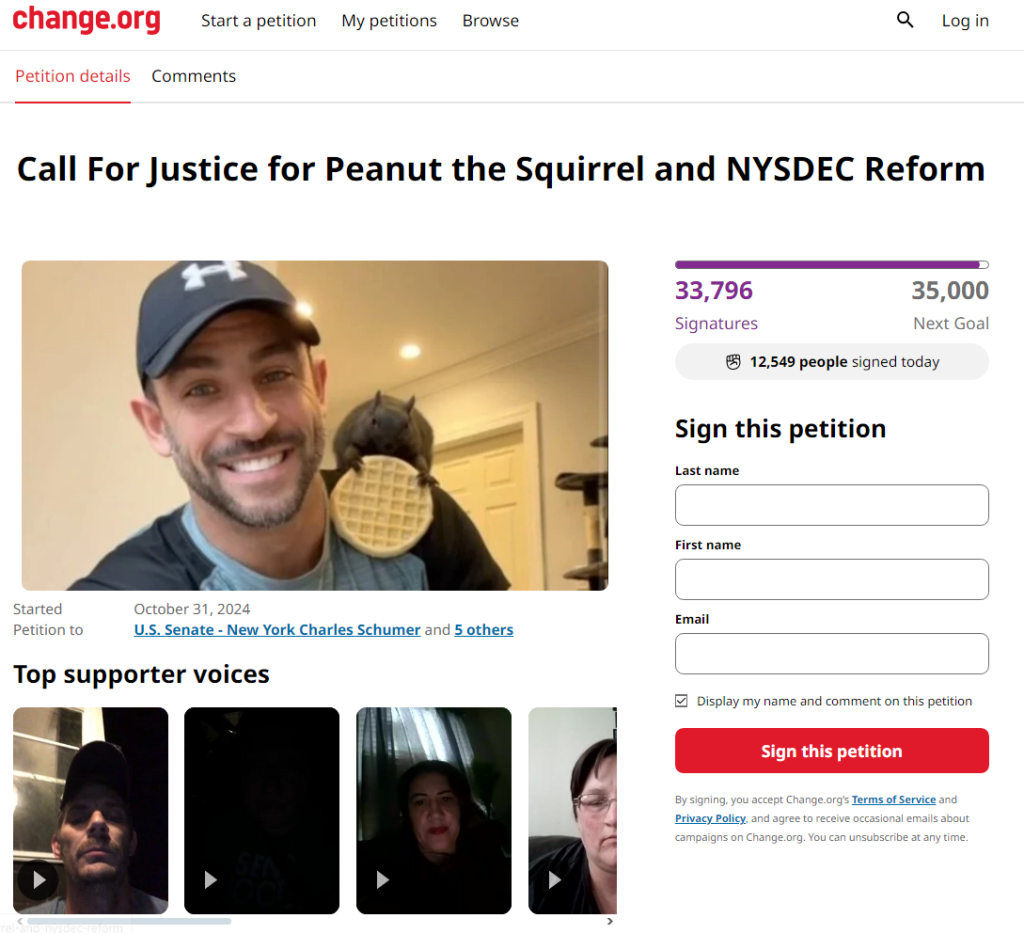The Story Behind Peanut the Squirrel and His Fame
Seven years ago, Longo found a baby squirrel wandering in New York City after its mother had been hit by a car. Realizing the orphaned creature had no one to care for him, Longo took the injured animal in, naming him Peanut and nursing him back to health in his Connecticut home. After an unsuccessful attempt to release him into the wild, Peanut returned to Longo’s porch, symbolizing an inseparable bond that would continue to grow.

Peanut quickly became an online sensation, gathering over 500,000 followers on Instagram, where he was often seen playing with Longo, eating waffles, and entertaining fans with heartwarming antics. Longo even established P’Nuts Freedom Farm Animal Sanctuary in Pine City, New York, where he cares for several other animals. However, the peaceful lives of Longo and Peanut were shattered on October 30 when the New York State Department of Environmental Conservation (DEC) seized Peanut from Longo’s home.
Why Was Peanut Taken? New York’s Wildlife Regulations
Following anonymous complaints about the presence of wildlife in Longo’s residence, DEC officials arrived at Longo’s Pine City property and confiscated Peanut, citing potential rabies concerns and laws prohibiting the ownership of wild animals as pets. According to New York wildlife regulations, keeping wild animals such as squirrels as pets poses potential public health risks. This policy is largely due to concerns that close human interaction with wild animals may compromise the animals’ survival skills or spread diseases such as rabies, a virus that can be transmitted to humans and other animals.
Longo, however, argues that Peanut’s attachment to humans prevented him from thriving in the wild and made him reliant on human care for his well-being. He further stated that Peanut had shown no symptoms of rabies or aggression prior to the seizure. Despite these objections, the DEC proceeded with Peanut’s removal, adding that during the seizure, Peanut allegedly bit an official, which led to his being euthanized to conduct a rabies test.
Public Outcry and Online Petitions Surge to Support Peanut
The news of Peanut’s euthanasia provoked outrage among his fanbase and animal rights supporters, sparking an online movement to seek justice for Peanut and potentially change the regulations surrounding domesticated wildlife. Longo launched a Peanut the squirrel petition and a GoFundMe campaign, both of which quickly gained traction. The petition, titled “Call For Justice for Peanut the Squirrel and NYSDEC Reform,” has gathered over 33,000 signatures, while the GoFundMe has raised substantial funds toward Longo’s legal fees as he fights for accountability from the DEC.

Longo has used his platform to memorialize Peanut, expressing heartbreak over the loss of his “best friend” and the “terrible nightmare” he has endured since Peanut was taken. “Peanut was the best thing that ever happened to us,” Longo shared through a tearful Instagram post, thanking supporters for their compassion and financial assistance in the wake of this tragedy.
The Legality and Ethical Implications of Euthanizing Wildlife for Rabies Testing
Peanut’s seizure and euthanization have drawn attention to the DEC’s policy of testing animals for rabies post-mortem, which involves euthanizing them to examine brain tissue samples. The Centers for Disease Control and Prevention (CDC) states that rabies testing currently requires a full cross-section of brain tissue, which is why euthanasia is mandatory. This policy, although based on public health safety, has raised ethical questions, particularly concerning animals like Peanut that are raised in captivity and show no visible symptoms of rabies.
Animal advocates argue that better solutions should be explored to test animals for rabies without euthanasia, while others urge the adoption of exceptions in cases where pets are unlikely to transmit the virus to other animals. Peanut’s case has emphasized the need for more research into humane, pre-mortem rabies testing alternatives and perhaps greater leniency for animals domesticated under unique circumstances.
How You Can Support Peanut The Squirrel Cause?
Peanut’s story has sparked discussions about the regulations surrounding wildlife care and the rights of individuals who rehabilitate and adopt wild animals. If you would like to support Longo’s cause, Peanut the squirrel petition on Change.org is still accepting signatures, while donations can be made to his GoFundMe to assist with his legal costs and future animal welfare initiatives at P’Nuts Freedom Farm.
As this case continues, Peanut’s fans and supporters hope that the outcry will bring about positive changes for both wildlife regulations and the rights of rescuers like Mark Longo.


